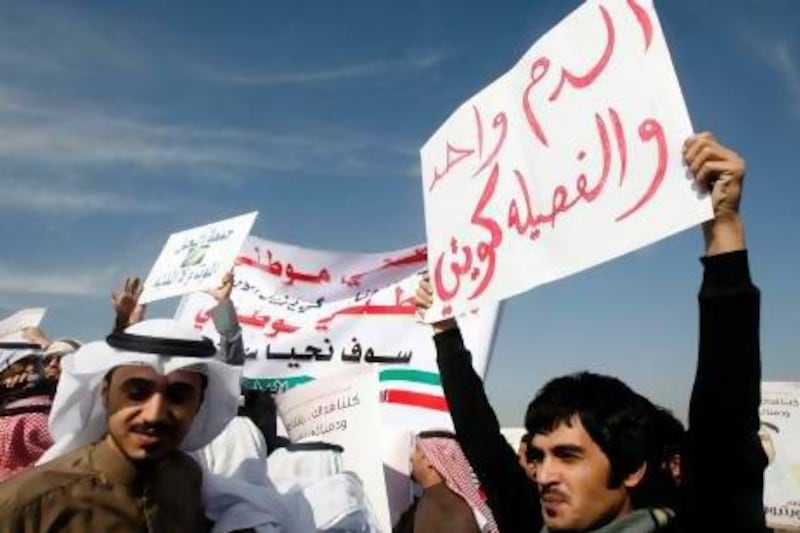KUWAIT CITY // Ahmed, a slim 40-year-old, has lived all his life in an impoverished settlement about 15 kilometres from the bright lights of the city centre.
Yet while Ahmed is quick to say how much he loves the country and feels Kuwaiti, his life here has been a struggle because he is not a citizen of the country or in fact, of any other. Ahmed is one of 80,000-120,000 inhabitants of Kuwait who are bidoon jinsiya, or "without nationality" in Arabic. As such, they cannot legally work, go to school or travel.
For some members of the bidoon, this could soon change. Last month, parliament passed a bill that calls for extending Kuwaiti citizenship to up to 4,000 people. The government has previously said as many as 34,000 bidoon could eventually qualify for citizenship.
Yet if the legislation is signed into law by the emir, Sabah Al Ahmad Al Jaber Al Sabah, it is not certain the bidoon will benefit.
The bidoon are not specifically identified as the beneficiaries of the proposed legislation. Also, bidoon activists say that tens of thousands of bidoon will still be in limbo, even if all 4,000 grants of citizenship go to members of their community.
For Ahmed and other bidoon, the wait for the legislation to be signed and implemented is cause for frustration.
"The Kuwaiti parliament has made a lot of laws, but nothing has changed," said Ahmed, who declined to give his full name because he has been arrested for advocating for citizenship. He cannot work and his children cannot attend school, he added.
In other words, life for the stateless remains a daily obstacle course as they try to navigate their way through everything from education to employment without proper identification.
Across the Gulf, some 500,000 people are believed to be stateless. The status of the bidoon has become one of the thorniest problems for governments, raising questions about national identity, demography and even security. Many countries admit that some of the bidoon deserve citizenship, but they argue that others are simply migrants trying to piggyback on the welfare system of the oil-rich state. Nationalising tens of thousands of citizens could also shift the ethnic, religious, and economic balance of already small local populations.
Historians and bidoon say that a majority of stateless residents in Kuwait have been there since it was founded in 1961. Some residents who lived far from the capital either didn't know or didn't understand that they needed to register with newly formed governments to obtain citizenship.
Other populations of stateless arrived through the years. In Saudi Arabia, for example, pilgrims in Mecca decided to stay. The kingdom also became a refuge for thousands of Rohingya Muslims fleeing ethnic and religious persecution in Myanmar.
Still more found themselves stateless even when born to citizens, since several Gulf states do not allow women to pass nationality to their children.
In recent years, Gulf countries have taken various routes towards resolving the status of their stateless populations. Bahrain, which was home to between 9,000 to 15,000 bidoon, nationalised its population in 2001, leaving only about 1,000 still without citizenship.
Riyadh has offered permanent residence to Rohingya refugees who today number 600,000, according to Dina Madani, an official an official in the Muslim minorities department for the Organisation of Islamic Cooperation. "They enjoy many economic benefits, and many are well established," she said.
Last June, the UAE granted an unspecified number of bidoon passports from the Comoros Islands. The stateless recipients said they hoped the documents were an interim step that would open their access to state services.
Kuwait's new legislation is the latest in a string of attempts to resolve statelessness here. The government's Central Apparatus for Illegal Residents has promised to settle claims of bidoon status within the next five years.
But many are sceptical the issue will ever be resolved.
"The [new] law was widely welcomed, but not by the community itself," the bidoon activist Mona Kareem wrote for Al Monitor. "Such laws were passed before, but were not met with commitment."
Despite the challenges, however, there is some optimism in Kuwait that public opinion is beginning to shift. Bidoon have taken to the streets several times over the Past two years to make their case that they are citizens too.
"We are not at war with this country," said Ahmed, who has taken part in the protests. "We're just saying we are citizens too."
Increasingly, Kuwaiti citizens are also getting on board with that message. Next month, young Kuwaiti professionals calling themselves Group 29 will organise the first public conference on statelessness.
It's a first step, said Lama Al Othman, a member of the group, in a statement, "to end this suffering has been going on 50 years."
edickinson@thenational.ae
twitter: For breaking news from the Gulf, the Middle East and around the globe follow The National World. Follow us





